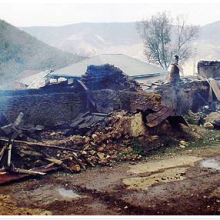Attack on Iran's Baha'i is a Human Rights Outrage
Posted: 17 Jul 2010
The destruction of 50 Baha'i homes demonstrates the Iranian government's disregard for its international obligations
Written by Barney Leith for the Guardian

The homes of 50 Baha'i farming families were razed in Ivel, Iran on 26 June. Photo: Baha'i World News Service
["]The governor general is like a physician … if he feels that there is a malignant tumour in the body of the society, he tries to remove it." Such was the official explanation given to Natoly Derakhshan, a Baha'i from the village of Ivel in Mazandaranprovince, Iran, after the homes of 50 Baha'i farming families were razed in Ivel on 26 June.
If farmers strike you as an unlikely tumour in a country that earns 20% of its GDP from agriculture, then perhaps you do not know the story of the minority Baha'i faith in the Islamic Republic of Iran.
Razing the Baha'i homes in Ivel is the latest step in an ongoing campaign. Baha'i farmers left Ivel several years ago because of local harassment and persecution. They return once a year to harvest their crops. This exercise of their basic rights to live in peace and work their land has nevertheless required permits from the provincial government. And now their property and livelihoods have been destroyed altogether.
Speaking to Radio Farda, the Persian-language station of Radio Free Europe, Derakhshan was asked whether the locals who demolished the Baha'i homes had government support. "We do not know and cannot say that it was ordered by someone," he said. But Derakhshan asked questions of his own. "What do you think?" he asked. "How could 50 homes be demolished without prior arrangements?" Derakhshan was told that letters of complaint the Baha'is had written to the authorities were "in opposition to the regime".
In Mazandaran, as in much of Iran, the persecution of the Baha'is is nothing new. "Baha'is have lived in this area for more than 100 years," said Diane Alai, representative of the Baha'i International Community to the United Nations. "But in 1983, a few years after the Iranian revolution, at least 30 families from this and neighbouring villages were put on buses and expelled." In the same period, over 200 Baha'is have been executed or killed, hundreds have been jailed, and tens of thousands have been denied their livelihood or an education.
Today 35 Baha'is are imprisoned, among whom are the seven former leaders of the Iranian Baha'i community, arrested in 2008 on allegations of espionage, propaganda and "corruption on earth". These charges warrant death under Iranian law. Their counsel, the Nobel laureate Shirin Ebadi, has said that "there is nothing, no reason" to convict the seven Baha'is. They have been held in Evin prison, "under conditions which clearly violate international standards" according to Bani Dugal, the principal representation of the Baha'i International Community to the UN. "They have neither beds nor bedding," she added, are permitted only two hours of fresh air a week, and are crammed into cells that restrict movement. Family contact is usually restricted to a 10-minute phone call once a week.
The treatment of the Baha'is in Iran is an outrage, a constant violation of human rights and an example of the Iranian government's disregard for its international obligations. At its root lies a religious fanaticism that seeks to grind away the 300,000 Baha'is of Iran. Lieutenant General Romeo Dallaire, veteran of Rwanda and Canadian senator, recently warned his senate that the "state-sanctioned persecution" of the Baha'is in Iran resembles "a nation leading its way into a potential genocide". The Baha'is are the largest religious minority of Iran but their faith is denied by the constitution. Despite being branded as apostates and spies, no Baha'i has ever been found plausibly guilty of the crimes with which they are accused. In the words of the founder of the Baha'i faith, Baha'u'llah, Baha'is are enjoined to work for "the good of the world and the happiness of the nations". In Mazandaran, both those hopes have been razed to the ground.
Source: Only Democracy for Iran, http://www.onlydemocracy4iran.com/2010/07/09/attack-on-irans-bahai-is-a-human-rights-outrage/







No comments:
Post a Comment